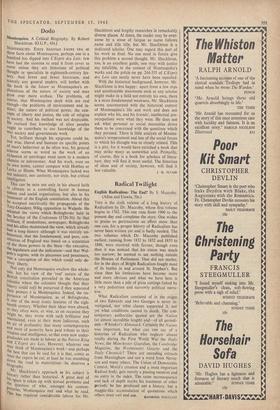Dodo
Montesquieu. A Critical Biography. By Robert Shackleton (0.U,P„ 45s.)
MONTESQUIEU. Every historian knows two or three facts about Montesquieu, perhaps one in a hundred has dipped into L'Esprit des Lois; few have had the stamina to read it from cover to Cover unless they are historians of political thought or specialists in eighteenth-century his- tory. And fewer and fewer historians, and scarcely any general readers, will bother with the book in the future as Montesquieu's ex- planations of the nature of society and man grow ever more archaic. The problems, of course, that Montesquieu dealt with are real enough—the problems of environment and in- stinct, the nature of political power, the con- cepts of liberty and justice, the role of religion In society. And his method was not despicable. He realised that knowledge of alien peoples Ought to contribute to our knowledge of the way society and governments work. Vet, brilliant though his epigrams could be, and wise, liberal and humane on specific points Of man's behaviour as he often was, his general scheme seems as weird as the work of an alchemist or astrologer must seem to a modern Chemist or astronomer. And his work, even on its own terms, cannot compare with Hobbes or Locke or Hume. What Montesquieu lacked was not industry, nor curiosity, nor style, but critical intelligence.
This can be seen not only in his absurd faith in climate as a controlling factor in human nature and social organisation, but also in his treatment of the English constitution. About this accepted uncritically the propaganda of the
,C accepted Whig opposition to Walpole. He adopted the views which Bolingbroke held in the heyday of the Craftsman (1726-36). In that brilliant, if tendentious, newspaper, Bolingbroke and his allies maintained the view, which already had a long history although it was entirely un- historical, that the fundamental, and pure, con- stitution of England was based on a separation of the three powers in the State--the executive, toe legislature and the judicature—and that Wal- Pole's regime, with its placemen and pensioners, Was a corruption of this which could only de- stroy liberty. Not only did Montesquieu swallow this whole- sale, but his view of the `real' nature of the British constitution prevailed in the American colonies- where the colonists thought that their liberty could only be preserved if they separated their powers it la Montesquieu. Indeed, the im- Penance of Montesquieu, as of Bolingbroke, Is one of the most ironic features of the eigh- teenth century. Whether their ideas were absurd, as they often were, or wise, as on occasion they rnight be, they wrote with such brilliance and alaintained, even at their most ludicrous, such an air of profundity that many contemporaries and most of posterity have paid tribute to their wisdom and intelligence, so that even now under- graduates are made to labour at the Patriot King and L'Esprit des Lois. However, whatever One Tay think of Montesquieu's work—and perhaps tilC best that can be said for it is that, comic as Were the capers he cut, at least he was stumbling te‘yri the road to materialism—he deserves a oiography. ,. Mr. Shackleton's approach to his subject is !iterary rather than historical. A great deal of Ills space is taken up with textual problems and `no question of who, amongst his contem- poraries, Montesquieu met and what he read. this has required considerable labour for Mr. Shackleton and lengthy researches in remarkably diverse places. At times, the reader may be over- come by a sense of fatigue as name follows name and title title, but Mr. Shackleton is a dedicated scholar. One may regard this part of his work as final. No one need in future give this problem a second thought. Mr. Shackleton, too, is an excellent guide, one may with justice say infallible, to the content of Montesquieu's works and the précis on pp. 244-355 of L'Esprit des Lois can surely never have been equalled.
With the historical background, however. Mr. Shackleton is less happy : apart from a few slips and questionable statements such as any scholar might make in a field not entirely his own, there is a more fundamental weakness. Mr. Shackleton seems unconcerned with the historical context of Montesquieu's life and work and does not explain why his, and his friends', intellectual pre- occupations were what they were. He does not ask what personal or social necessities drove them to be concerned with the questions which they pursued. There is little analysis of Montes- quieu's temperament and less of the social forces to which his thought was so closely related. This is a pity, for it would have enriched a book that may strike many as somewhat arid. Primarily, of course, this is a book for scholars of litera- ture; they will find it most useful. The historian of ideas and of society, however, will find it


































 Previous page
Previous page